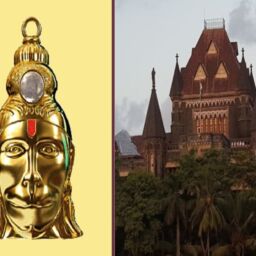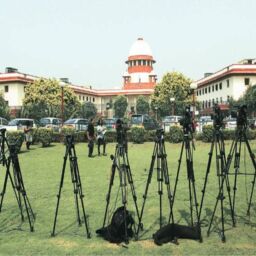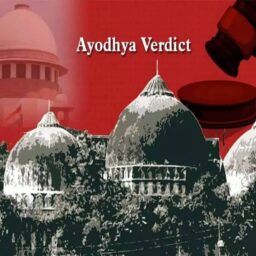
“We the people ”, are the first verses of the living document, signifies the intent of our constitution-makers of future India. The text elucidates that the people form the backbone of the largest democracy in the world. Hence today to ensure the will of the forefathers we follow the idea of indirect representation of the authority, which tends to form the laws to govern oneself i.e. the legislature.
This representation is ensured by the way of election to both Centre and the state legislature. The election in India is covered under Part XV of the constitution of India. The tenure of both the legislatures is of five years.
The cycle of the election of the legislatures in the state and Centre initially ran together but was interrupted. Which resulted in a procedure for a vehicle in the election. What happens next is what we see today: the multi-phase said reoccurring elections are the result of the chain broken. This chain is the constant election mode in one or the other part of the country. This chain had its pros and cons.
The plight of the people is heard now and then. A result of which could be the emergence of the regional Political Parties, which operate on the ground level and work for the cause of grassroots problems.
Seeing the contemporary times the states going to the polls are West Bengal, Kerala, Assam, and Tamil Nadu. The Union Territory of Puducherry will vote to choose its assembly and government. Some key observations could be made like, In the nation swept by fear of next COVID-19 peak the states witness excessive vote collection drives (like rallies, Jan Sabha, etc. ) which involves huge masked and unmasked masses, and in such times no protocols of social distancing are being paid heed to. Even the leaders run unmasked at times. Is there no COVID-19 infection there? is a frequently discussed topic on social media. Such questions do not only pull us back in our mission to defect COVID-19 but also tend to bring alarming hypes in the number of cases to be reported in near future.
Also a major “policy paralysis” is observed in the country and the states at voting. Policy paralysis refers to a time when no major policy decisions are taken. At such turbulent hours, the leaders are absorbed in serving their party more than their people. And due to recurring elections, the policy paralysis becomes more redundant. The proof of this is that in the states on election mode, run open and without restriction while the other states are heading towards lockdown conditions.
An issue of communal tensions also becomes evident when the politically motivated speeches seem to be ingenuous but prove to be fatal for democracy. Also the new idea of voting rights to be given to the Indians living abroad[1]. This policy requires a positive response from the community for this, feasibility and recurring elections may make it a bit redundant to spare time to observe the stats of their constituency and then vote. Hence a simultaneous election may work here.
Some pros list the frequent nerve check of the peoples, by which the major future policy decisions may be amended to people’s interests. Politicians or the government being at the disposal of people, the demands reach their ears quite early. The reoccurring elections also enable young voters to cast their voices as soon as possible, but in an, at a stretch election, this may pose a doubt unattended.
The One nation one election is touted as a solution. In this a simultaneous election of both Lok Sabha and Vidhan Sabha being held at one time. Like two EVMs being placed in one booth where a certified voter will cast two votes- one for the Lok Sabha candidate and one for the Vidhan Sabha candidate. This, as viewed by some, could cause a tremendous shift leading to misguided voting at times.
So a midway proposed could be, not the extreme of One nation one election or the now ongoing recurring elections, rather a way of putting the nation into an “election thread”.
In this, the duration of the election may be declared for a defined period, like a month or two. The first month of the election could be dedicated to the Lok Sabha elections and its campaigning in the whole country. Then in the next turn, the local body elections i.e. for Vidhan Sabha could be moved with.
The incurred benefits will be huge. As the regional parties get a space to reach the masses the regional issues will preserve their identities. Keeping the procedure short and crisp retains the idea of excessive policy paralysis as in one time or the other the government at the Centre or state will keep a watch on the policies. Taking a step further this will ensure robust participation of the voters as they get to interact with their representatives at both Centre and state almost simultaneously. By this, the comparative view of the government at Centre and state could be observed and a wise decision may be made. Owing to the pandemic the limited duration of campaigning will ensure a close watch by the Election Commission and also limit political movement hence may lower the number of campaigning events.
All kept apart, this idea reserves its cons. One of which is involving some major constitutional amendments. It also holds an idea of power abuse which may be used by ruling political parties at the Centre and state during campaigning, leading to the sidelining of non-ruling political parties. But these cons could be addressed by our policymakers. Thus this idea will help us discover a new dimension in the elections of India.
Hence all in one, Elections are not a mere of casting votes rather the “Mahotsav” in India. But in these turbulent times, a balanced approach by political parties and people must be taken. A proposed solution could be the “election thread”.
Author(s) Name: Sukanya Nema (DNLU, Jabalpur)
[1] https://economictimes.indiatimes.com/news/politics-and-nation/ec-proposes-extending-postal-ballot-facility-for-eligible-overseas-indians/articleshow/79510615.cms
















